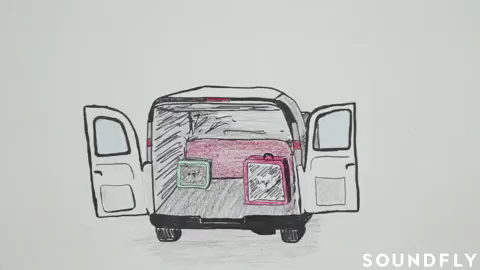What US Artists Touring Abroad Need, How To Procure It
For lots of bands and artists, being a touring musician presents for them and opportunity to see the world while simultaneously pursuing their dreams. That said, international touring presents its own set of challenges for those in the US looking to share their music in other countries.
___________________________
Guest post by Robert Lanterman of Soundfly's Flypaper
For many artists, it’s a dream to see the world through the windshield of their vehicle. Touring and making a living on the road is an exciting way to travel, meet people, develop deeper relationships with your cohorts, etc. And for American artists, it’s a dream come true when they’re finally able to take their live show overseas.
But for so many, it remains a dream for way too long. There’s a defeatist mentality among aspiring American musicians, who just assume that you need to be successful here before touring abroad. Well, I’m here to tell you that’s not true.
Playing music in other countries is far from impossible for independent artists, in fact, it’s often easier for the non-represented, but it does require a lot of knowledge and research beforehand. There are some things you need to look into before booking a tour — a checklist of preparations, if you will. So read this through, take note, and when you think you’re ready, go for it.
Get Your Flippin’ Passport, Dude
This is the number one most important thing you need to travel outside of the country, and if you don’t understand why then please read this. But despite the fact that you need a passport to leave the country, like, at all, I’ve known so many musicians who have waited until the last minute to get their passport situation figured out.
But understand, this is the one thing you really can’t wait to secure. There is absolutely no reason to put off obtaining or renewing your passport before a tour, because without it, there is no tour. Booking a string of dates you can’t show up for is unfortunate and unprofessional, not only for your fellow musicians, but also for promoters and fans across the world. So get that handled before you start booking dates abroad.
Your local post office should be able to help you get a passport if you’ve never had one before. It’s not the simplest or fastest procedure, which is why you can’t wait around to get it taken care of! If you do, despite my aggressive warning, find yourself in a situation where you’re rushing to get your passport done, there are (thankfully) sites such as RushMyPassport.com that provide legitimate options for passport expediting starting around $100.
Transportation
If you’re touring Canada or Mexico, your transportation is probably reasonably easy, you can generally just drive whatever vehicle you normally tour in. Canada has some pretty exceptional places to play (like Vancouver, Winnipeg, and Montreal!) and none of them are too difficult to get to driving. If you’re going down to Mexico, there have been a few bands who have taken the more questionable route and crossed the border vehicle-less… though we don’t endorse this path. But if you’re headed somewhere you can’t take your own vehicle, what is an artist to do?
This is where the cost of touring starts to add up, because you will have to find some way to get from stop to stop. In Europe, trains are reasonably cheap and so is flying via discount airlines like Norwegian and EasyJet, but for bands with amps and drums and instruments, this might not be a viable option. You may need to rent a car, but to save on costs, you can consider either borrowing one from another artist there, or touring together with another act in the same van.
Now, technically, an American drivers license allows you to drive for short periods of time in most European countries, but that’s not the case everywhere. Before your tour, check with the embassies for each country you’re going to visit if you plan to drive. Or, you can apply for an International Driver’s Permit, or IDP.
Websites like driving-in.com are informative resources for learning about the driving differences between the U.S. and other countries. And as a last suggestion, if you’ve got the budget for it, consider hiring a local driver, so that you don’t have to worry about navigating foreign signs, laws, cultural cues, and road configurations.
Gear
If you can’t take your van, you probably won’t be taking the lion’s share of your gear either. Guitars excluded, it costs a lot of money to move gear overseas, especially amplifiers and entire drum sets. Additionally, many other countries have different electricity voltages and outlet plug shapes, and if your gear isn’t adaptable (most isn’t) then you have to bring or rent step-down converters and adapters. Amps, on the other hand, should just be left at home and rented upon arrival.
Similar to the van situation, borrowing gear from fellow musicians is the cheapest and easiest way to handle the situation. However, if you don’t know other musicians overseas, then your next best option is to rent.
Michael Gallant wrote about this a few years ago on Disc Makers. He brought up the wise point that if you do choose to rent internationally, get two or three quotes.This will be expensive, so do your best to avoid getting ripped off. Try to get gear close to the kind that you’re familiar with, so you’re not stuck adjusting or struggling with gear mid-set.
A Tour Itinerary Is a Good Idea
Having a tour itinerary is always smart, but especially when you’re in another country. The more prepared you can be, the better your trip will go. So knowing where you’re playing, who all is in charge, how pay is working out between bands and venues, where you’re staying, and who you’re staying with are all good things to know ahead of time.

Not everything is foolproof. There is no doubt in my mind that the majority of independent artists that tour overseas don’t have all of this laid out, and I don’t blame them. But if you’re reading this, it’s because you want to be more informed, and that’s a great instinct!
Treating it like a school field trip isn’t the worst idea either. What I mean by that is to develop a list of emergency contacts, cell phone numbers (if you’re touring with anyone you don’t know), and medications your band members might need. If you have a chronic illness, prepare yourself and your bandmates in the event any serious trouble arises while on tour. Apart from this, your itinerary should include addresses, drive times, customs information if you’re touring in more than one foreign country, and any other notes that may help you have a smoother trip in a foreign land.
Proper Documentation
Now we’re onto everyone’s favorite topic. Some people choose to tour internationally illegally. The government doesn’t know you’re there to play shows, and, I get it, it’s hard to make money on tour, so why spend money on visas? However, for those of us who don’t want to risk missing tour dates or having gear or merch confiscated, proper documentation is a must.
The Balance wrote an updated piece on what kind of documentation you’ll need to tour internationally. I recommend you read it, but in general, the documentation you need depends on the laws in the country or countries you’re visiting. In some places, you’ll need specific artist work visas. For more information on touring in Europe, specifically, this is a helpful piece, and here’s a bit of information on Japan.
It should be noted that despite the fact that American artists do not need to pay anything special or have any kind of visa to get into Canada, it’s always smart to try to get official “invitation letters” from venues and promoters to use as documentation proving you’re there to do exactly what you’re claiming to do, and not trying to illegally import music gear. However, the United States is much harder on Canadian artists.
Miscellaneous Advice
I don’t think that any of us would argue against the idea that learning about a different culture’s customs, laws, history, and geography before visiting makes for a smoother visit. Touring is the same as any kind of traveling in this sense. When meeting people, you’ll be welcomed more quickly and warmly if you can meet people halfway, and the relationships you build on tour will absolutely help you grow your artistic career.
Bring things to enjoy during the long travel hours — books, good music, games, etc. — because this is still tour and a lot of your time will be spent on the move. Also, bring a physical map or download maps for use offline in case something happens to your smartphone, and so you don’t have to burn up all of your data. Other than that, keep your bag in your sight at all times, try weird foods all the time always, and have a great time! Send us a postcard.
Have you toured in another country? What’s one piece of advice you would offer to someone planning for the first time? Tell us in the comments below.
Don’t forget to check out Soundfly’s free Touring on a Shoestring course for tons of advice and resources for booking your next (or first!) national or international tour on the cheap! Here are some quick, helpful tips on how to plot an effective tour route.


